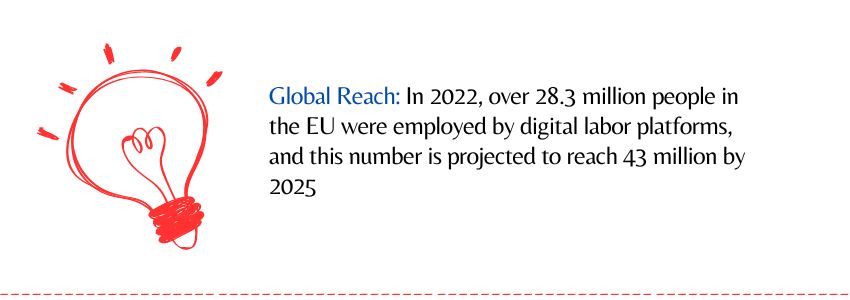What is the Gig Economy?
The term “gig economy” refers to a labor market in which workers engage in short-term tasks or “gigs,” rather than holding long-term, full-time positions with a single employer. Gig workers operate as freelancers or independent contractors, often finding jobs through digital platforms.

The Pros and Cons of the Gig Economy
Pros of the Gig Economy
Flexibility
Gig workers have the freedom to set their hours and take on as much or as little work as they want. This flexibility is particularly appealing to those who prioritize work-life balance or have personal commitments, like caregiving or education.
Diverse Opportunities
The gig economy provides opportunities across various industries, from tech and writing to transportation and hospitality. According to Upwork, 60% of freelancers in the U.S. report finding more diverse job opportunities than they would in traditional employment.
Independence
Freelancers are their bosses, allowing them to select projects that match their interests and skills. This autonomy fosters entrepreneurship and self-management, leading to more personalized career growth.
Supplemental Income
Many gig workers use freelance work to supplement their primary income. Around 40% of gig workers in the U.S. hold a full-time job alongside their gig roles, according to a Pew Research Center report.
Low Barriers to Entry
Many gig jobs require minimal qualifications, making it easier for individuals to start working quickly. For example, rideshare drivers need only a car and a clean driving record, while freelance platforms allow anyone with a skill to find work.
Remote Work Opportunities
The gig economy opens doors to remote work, allowing workers to perform tasks from anywhere in the world. This has become particularly beneficial since the COVID-19 pandemic, with many turning to remote freelancing to sustain their income.
Cons of the Gig Economy
Lack of Job Security
Gig work is often unstable, with no guaranteed income or long-term contracts. Workers face inconsistent hours and pay, making financial planning difficult. 55% of gig workers cite irregular income as a significant challenge, according to the Gig Economy Index.
No Benefits
Unlike traditional employees, gig workers don’t receive benefits such as health insurance, paid leave, or retirement plans. This lack of social safety nets makes gig workers more vulnerable in times of illness or economic downturns.
Isolation
Many gig workers operate alone, missing the social interaction and professional support systems found in traditional office environments. This can lead to feelings of isolation or burnout, particularly for long-term freelancers.
High Competition
The gig economy is highly competitive, with many workers bidding for the same projects. This can drive down wages, especially in sectors like writing, design, and virtual assistance, where a large number of freelancers compete for limited opportunities.
The gig economy offers both opportunities and challenges. It gives workers flexibility and various ways to earn money but also brings concerns about job security and lack of benefits.
Understanding how the gig economy works is key for navigating the future of work. Whether you’re a worker exploring gig jobs or an employer adjusting hiring strategies, knowing the pros and cons is essential for making smart choices in this evolving landscape.
-Nandhini,
Content Marketing Team.


